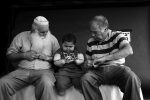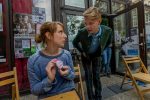Aiden Cumming-Teicher celebrated his bar mitzvah by organizing Our Voices. (photo from Aiden Cumming-Teicher)
Aiden Cumming-Teicher got his start in acting at the age of 9. In the four years since then, he has played leading roles in numerous films and documentaries, receiving several Joey Awards nominations for his acting and winning a Young Entertainer Award in Los Angeles. For Beyond the Sun, he spent two months shooting in Argentina last year. He describes the film as “a religious adventure movie for kids.” The film – which features Pope Francis – was a highlight of his career so far, he said.
This year, Aiden celebrated his bar mitzvah in a novel way: by organizing Our Voices, a film festival that put child and youth filmmakers in the spotlight. Said Aiden of his unusual choice, “I wanted something that wasn’t all about me, something that gave back to other people, gave them the chance to express themselves and the opportunity to be heard and celebrated.”
Our Voices received more than 200 submissions from around the world and the contest culminated in a screening at Hollywood 3 Cinema in Pitt Meadows on Nov. 4. The entries represented a wide range of
genres and narrative styles: documentaries, films about relationships, films about giving kids the tools to deal with anxiety, music videos, comedies. The selections were judged by a panel that included professionals in the movie industry, with Aiden having the final say on the winners. His favourite movie was A Pencil, a satire on Apple. “It didn’t really fit in the categories so we created a Wildcard Award,” said Aiden. “We also made a Tikkun Olam Award for another wonderful film from Australia, Today?, which was about giving kids the tools to express themselves, finding solidarity against bullying.”
Admission for the screening of the 60-plus films was by donation, with the proceeds being donated to B.C. Children’s Hospital. Aiden presented a cheque for $610 to the hospital on Nov. 7, to show his gratitude for the care they have provided him, his friends and family.
“A big part of my life is finding ways to give back, because I know that I have been blessed,” said Aiden. “My family has faced difficult times – such as my mom’s cancer diagnosis a few years back – but we have always found ways to make it through.”
With his parents, Chris and Apis, Aiden helps others, despite whatever adversity he might be facing. “When my mom was sick, we made a kids book to help others going through the same thing. It’s available as a free PDF to anyone that needs it, and some printed copies have been given away too.”
Regarding his approach to tzedakah, he said, “A big part of this is feeling that we are helping to heal the world, even a little. I can’t fix everything, but being a kid doesn’t mean I’m helpless. I can still make a difference, even if it’s a small one.”
He credited his family for his sense of agency. “I am really thankful that I have a very strong, loving family, and that we tackle all challenges together, perform mitzvot together.”
This was certainly the case with a documentary he made on Vancouver Island, about saving at-risk salmon fry during a brutal drought.
Some of Aiden’s philanthropic work has brought him into contact with the harsh potential realities of life as a young adult. In 2016, he received an award at the Wall of Stars, an annual event that celebrates excellence in entertainment, with an emphasis on mutual support among artists. “The best part was that it was presented by Ms. Carol Todd, mother of Amanda Todd,” he said, referring to the teen who committed suicide in 2012 after relentless bullying. “My mom was there to see it,” he said.
Reflecting on the personal rewards of his work, Aiden said, “Making this film festival made me very happy. We got to see so many perspectives from around the world and see so many different lives.”
The big picture, though, is the impact of all this on the world around him. “I have been lucky,” he said, “to be in projects that all have a positive message.”
Shula Klinger is an author and journalist living in North Vancouver. Find out more at shulaklinger.com.




